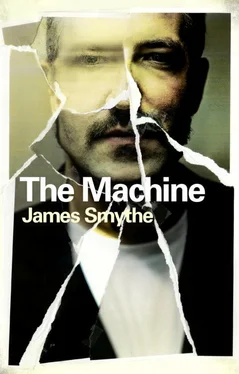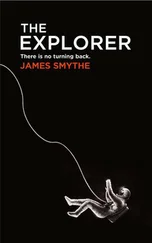She helps him sit up slightly more, and lifts the bottle to his mouth. He reaches for it, tongue out, desperate, and she pours it faster than she should, drizzling the water down his chest and into the sweat of his chest hair.
Come on, she says. That’s it. He drinks most of the bottle, gulping it down.
Thank you, he says.
What? Beth stands up. She stands back. What did you say? He doesn’t move, doesn’t look at her. His eyes are open, focused on the ceiling, on the veins in the paint. Say that again. Vic? Vic. She says his name repeatedly, as if one of the versions of it might make sense to him: one with a particular tone in her voice, or a particular lilt. She draws closer again, kneels on the bed and looks into his eyes. They don’t search around or try to avoid hers, but they’re not with her either. Somehow vague. She looks at his lips. Thank you, she says. Say thank you. But he doesn’t say anything.
Okay, she says. She stands again. She runs her hands over her head, and she looks at the Machine. It’s plugged in and switched on already, but she could swear that she unplugged it. It’s possible that she got it wrong, just as it’s possible that she didn’t hear Vic thanking her, in his voice, with his polite tone. Nothing casual there. She presses the screen. It’s as it was yesterday, as she left it. Five recordings down, one after the other, and then repeated. Blocks of five, at an hour each. Five-minute break between each, for toilet and drink, then an hour’s break for lunch, then the whole thing repeated. She doesn’t know if the information presented to Vic through the Crown is the same, though. She doesn’t understand the technology at all, even though she’s read everything she can about the Machine.
They started with slugs, she knows: removing the part of a slug’s memory that told it where food was. Slugs rely on experience to drive them towards whatever it is that they’re looking for. They remember. Scientists took that out and made them forget, and the slugs were lost. It wasn’t lobotomizing them: it was a targeted jolt. Proper science. An injection, and electricity, like a lightning bolt that only damaged the part you wanted it to. And after that they moved on to other animal trials, nothing cruel about it, because you’re making something forget the inane. Nothing important. Brain memory is different from muscle memory: even down to the actual filing system of how we remember. And then on to humans, and the introduction of the Machine, because the power needed to process it all was tremendous. In the earliest trials, the Machine occupied an aircraft hangar. There are pictures of it on the internet, this hulking thing that went back and back, filling the space like the first computers, a room full of wires and chipsets. They took memories away from people, and they discovered that they could also jolt those memories back: that the Machine burned bridges, but could also repair them, in a way. That’s what Beth understands: where it came from. They made the technology useable, put it out there before it should have been – when there were no limits to the havoc it could wreak – then tried to backtrack by imposing guidelines, dressing the Machines up as handy household appliances. But it was already over.
Beth worries that she’s pushing him too hard. That was how she got into this: rushing. She was in charge of his treatments in the latter days, because they wanted to remove the doctor from the equation. It was important that Vic ultimately forgot that he’d even had treatments in the first place. The last day of any patient’s experience was to have that part erased, wiping down the surfaces and locking the door on your way out. So Beth was in charge, and she was meant to take her time with the last few stages; ten stages, that was all. But she rushed it, and then… That’s been hanging over her for years: not knowing if Vic would have been left broken without her help, or if she was the catalyst. One treatment a week, she was told: and she condensed them into a fortnight.
Now, the instructions on the internet forums tell her that it doesn’t matter. That the pace at which memories are put back in is at the user’s discretion. She wonders who these people are, on the forums. What they actually know. The creators of the Machine are taking so long to work this through themselves, to reach an actual solution and make it public, only promising things in press conferences with their performing test cases. And the guerrilla underground has taken control instead. She laughs, to think of herself as that: part of a movement defying logic, and science, and time. At the forefront of something. She laughs because of how she got here.
It’s nearly morning, she says. You need to use the toilet. He’s made it through the second night dry, apart from the sweat. Tomorrow night she’ll give him a sheet instead of the duvet. She didn’t even think, because the duvet was what they had in their old house, and the decoration, the furniture. All of it imported to make this bedroom feel as much like their old room as possible, with the exception of the Machine, filling that wall, in case that helps to nudge his memory even slightly. She helps him up and leads him through. His walking seems better. More focused, somehow. She sits him on the toilet and stands outside the room.
The day I watch you take a shit is the day I know this marriage is over, Vic joked once. But it wasn’t really a joke, she didn’t think.
Back to the bedroom, she says, and she would swear that he leads slightly: that he’s the one who instigates that first assisted step, and that he knows the direction, that she doesn’t have to twist his body to meet it. He kneels onto the bed as well, she thinks, and when she goes to turn his body to lie down he doesn’t feel as heavy as he did the day before. Maybe just a night’s sleep, and Beth is less tired herself. She takes the Crown down and puts it on him, and the black marks are back, she notices. Not that they ever left, but they faded, like the way that bruises fade, only they never completely abandoned his scalp; and now they seem brighter. Which makes sense, because they’re always going to be tender, Beth supposes. She notices that the Crown has pushed up some of his hair into a tuft; she smoothes it down.
She presses the button and gets the next recording playing. REPLENISH, like a shampoo, like an energy drink. Vic’s voice is all she hears. She almost entirely blocks the doctor out now, as if he’s not important. She thinks that that must be what makes him good at his job: his ability to fade into the background. Vic talks about what made him want to get into the army, and how his father pushed him. Background experiences that made him who he was. Who he will be.
With the first shift over, Beth gives him food. This morning it’s soggy cereal, corn flakes left to melt in milk. Beth has to lift the spoon and open his mouth with her finger and slide the food off and onto his tongue, and then close his mouth, and he swallows of his own accord, an exaggerated motion in which he seems to tense every muscle in his jaw and neck in order to make it all go down. Then they repeat the process, so eating the bowl of cereal takes nearly half an hour. It’s the longest break he’ll get before lunch.
The second session begins, and the playback follows on from the last. Beth sits and listens and looks around the room, and suddenly the hour is gone. She finds herself staring at the photographs that she’s put in cheap frames on top of the chest of drawers; or at Vic’s body; or at the bowl of potpourri. She can’t remember how long ago she put it in the room, but it still smells. The sort of thing her mother would have done. She’s looking at the Crown on his head, listening to nothing, it seems, thinking about her own headache – how these sessions take it out of her as well, and that’s important, that the partner understands and feels it – when the doorbell interrupts.
Читать дальше
Конец ознакомительного отрывка
Купить книгу










